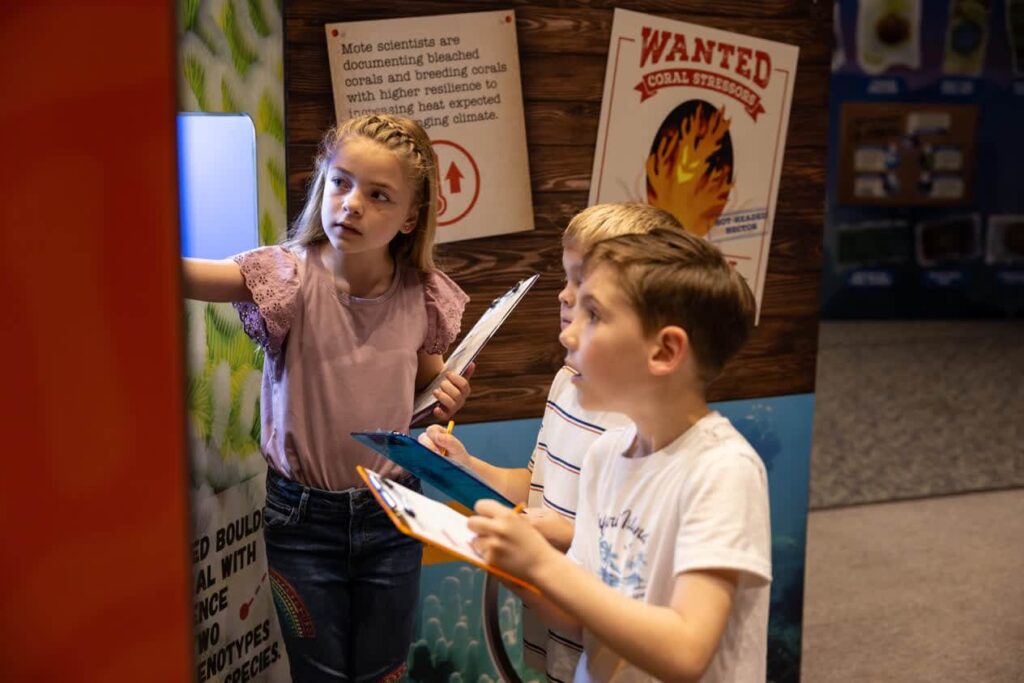On Saturday, March 3, Mote Marine Laboratory & Aquarium unveiled a captivating new exhibit titled Mystery Reef. Included in regular admission, the exhibit explores the threats facing Florida’s coral reefs. Through activities such as a scavenger hunt, puzzle blocks, and an air maze, guests will leave with a better understanding of reef risks and mitigation strategies.
Mystery Reef encapsulates cutting-edge research conducted by Mote scientists, addressing issues actively tackled by multiple Mote research programs, including Ocean Acidification, Coral Health and Disease, Marine and Freshwater Aquaculture, among others.
“Conservation of coral reefs isn’t just about protecting a beautiful ecosystem; it’s about safeguarding the very foundation of marine biodiversity and our planet’s health,” said Dr. Michael Crosby, Mote President & CEO. “By continually researching and sharing information on coral reefs, we illuminate the path toward their preservation, ensuring the intricate balance of life within our oceans for generations to come.”
While educating guests on the health of Florida’s coral communities, Mystery Reef also allows guests to become coral detectives for a day. Mote invites exhibit visitors to embark on an exhilarating, crime-solving scavenger hunt. With their sleuthing caps on, guests can investigate which prime suspect is guilty of hurting the reefs. Each suspect represents a different reef threat:
- Sickly Sal– Coral Disease
- Coral diseases, often occurring in response to environmental stressors, cause massive reef decomposition.
- Captain Conquerer– Invasive Species
- Invasive species are organisms introduced to an environment where they are not native, quickly adapting and reproducing. Due to a lack of natural predators, they overwhelm and dominate the environment. The red lionfish, a nonindigenous, venomous fish, exemplifies an invasive species harming Florida’s coral reefs.
- Corrosive Carl– Ocean Acidification
- Ocean acidification occurs when carbon dioxide (CO2) from the atmosphere is absorbed into the ocean, lowering the pH. Rising ocean acidification is associated with negative effects, including damaging coral reefs and disturbing calcifying organisms’ shell and skeleton growth.
- Miss Match– Coral Parents Incapable of Pairing Up
- Corals must be close in proximity to fertilize after spawning. As ocean health declines, healthy coral parents become rarer, producing fewer healthy corals.
- Hot-Headed Hector – Rising Ocean Temperatures
- As oceans absorb excess heat from greenhouse gases, water temperatures rise. Increased ocean temperatures may induce coral bleaching (loss of coral pigmentation), disruption of fish breeding grounds, intensified hurricanes, and sea-level rise.
Guests can tangibly “mitigate” the suspects through various interactive exhibit elements. They will have the opportunity to “whack-a-lionfish,” simulate coral spawning through an air maze, and connect puzzle pieces to build a healthy reef. The exhibit will also showcase a giant inflatable coral where guests can complete their detective work.
“At Mystery Reef, we aim to empower visitors to become stewards of the ocean,” said Samantha Bledstein, Exhibit Manager at Mote. “By engaging with this interactive exhibit, guests not only gain insight into the challenges facing Florida’s reefs but also discover how we can work together to protect them.”
Mote needs help solving the mystery of what– or who– is hurting the reefs. Guests are invited to use their brain coral and start Kraken the case today!
Mystery Reef is included in regular Mote Aquarium admission. Mote Aquarium is open from 9:30 a.m. – 5 p.m. every day. For more information, visit mote.org/mystery.
*The exhibit is paid for in part by Sarasota County Tourist Development Tax revenues.
About Mote: Mote Marine Laboratory & Aquarium has a nearly 70-year legacy as an independent, nonprofit, 501(c)3 global marine research and science education institution. Mote began in 1955 and flourished on the foundational pillars of “Passion, Partnership and Philanthropy” – the passion of a single researcher, Dr. Eugenie Clark, her partnership with the community and philanthropic support, first of the Vanderbilt family, later with the significant support and guidance of the William R. Mote family, and today through donations by thousands of individuals who believe in the mission of Mote.
Today, Mote has grown into eight campuses stretching from Tampa Bay to Key West, with a ninth new campus, the Mote Science Education Aquarium (Mote SEA), currently under construction. Mote has more than 25 diverse world-class research programs studying oceans locally and internationally, with an emphasis on positively impacting conservation and sustainable use of marine resources. The current Mote Aquarium in Sarasota showcases Mote Research and is open from 9:30 a.m. to 5 pm, 365 days a year. Learn more at mote.org.
Contact Us:
Mote Marine Laboratory and Aquarium, 1600 Ken Thompson Parkway, Sarasota, Fla., 34236. 941.388.4441


